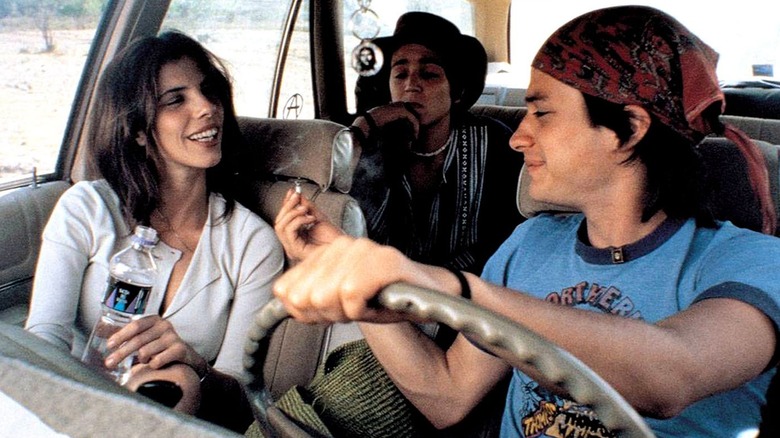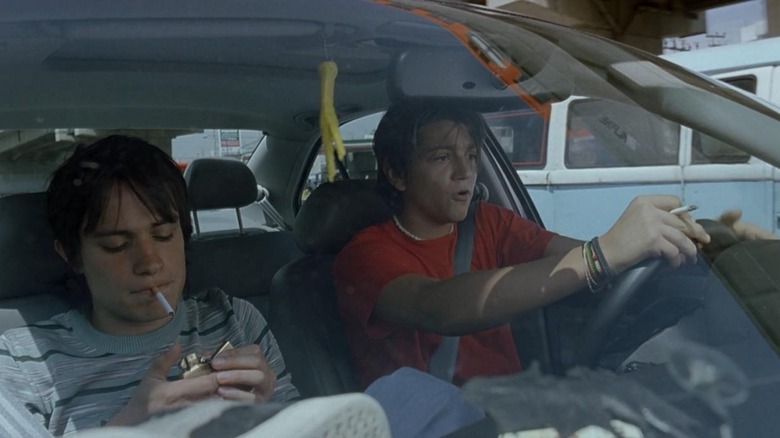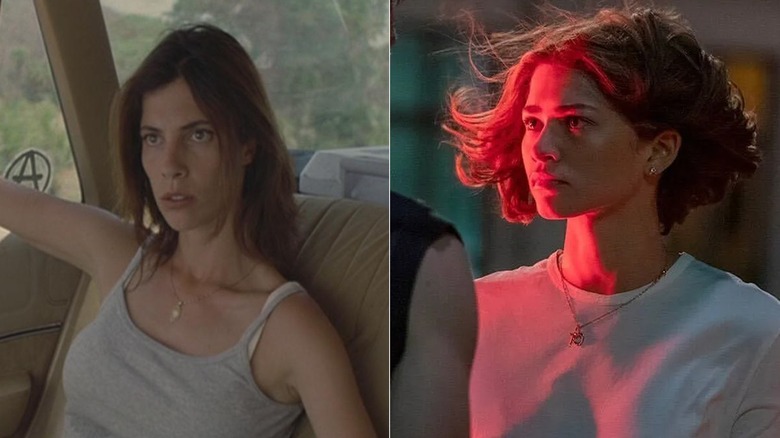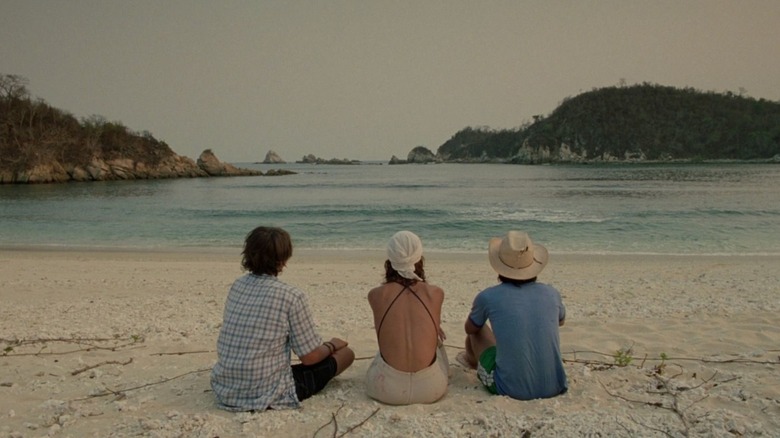Challengers Borrows A Key Element From Alfonso Cuaron's Best Movie
This post contains spoilers for both "Challengers" and "Y Tu Mama Tambien."
It's only its first weekend in theaters, but "Challengers" has already gotten everyone talking. There's just something captivating about a love triangle where all sides touch, and it's even more captivating when all that lust and jealousy get boiled down to a single heated match of tennis. There is no greater upping-the-ante movie moment than when Patrick (Josh O'Connor) subtly signals to Art (Mike Faist) during the game that he's recently slept with his wife Tashi (Zendaya). There've been plenty of fictional sports matches where a mid-game twist got everyone on the edge of their seats, but "Challengers" casually outdid them all.
What made "Challengers" truly special is Art's reaction to Patrick's reveal: he simply says, "F**k off." It's a line that could easily have been delivered with straightforward rage, but Faist throws some bemusement into the mix, a John Mulaney-esque vibe of earnest curiosity. It's reminiscent of that "Saturday Night Live" sketch where Mulaney's character finds out his best man has been sleeping with his bride, and Mulaney's not so much angry as he is bewildered by the revelation.
It's funny, but it's also the perfect line reading for Faist, as this dynamic is far more complicated than mere cuckoldry. Art doesn't just see Patrick as a guy he's in competition with for Tashi's love; he also sees him as a love interest himself, even if he might never admit this outright in the film. That's why Art seems strangely happy in the final few moments, as if a weight's been lifted off his shoulders. There's been a breakthrough in the two guys' relationship, not unlike the breakthrough in a certain male friendship from a movie 23 years earlier...
Y Tu Mamá También also features a complex bisexual love triangle
Directed by Alfonso Cuarón, "Y Tu Mamá También" (or "And Your Mother Too") is a 2001 Mexican road trip film about two male teenage friends, Julio (Gael García Bernal) and Tenoch (Diego Luna), who invite an older woman Luisa (Maribel Verdú) on a road trip with them to a secluded beach across the country. The boys' main stated goal is to sleep with Luisa. They wouldn't usually stand a chance with her, but what they don't know is that Luisa's just found out that she has untreatable terminal cancer, so she's far more available than either of them anticipated.
But when Tenoch sleeps with her first, it's not as happy an occurrence as either boy hoped. The experienced Luisa is clearly not that impressed with Tenoch's teenage sexual performance, and Julio is overtaken with jealousy when he finds out what happened. Luisa notices the rift between them, and decides to sleep with Julio to settle the score. It works: by the final act, Julio and Tenoch are back to being friends, and they're more open with each other than they ever were before.
It's not a huge surprise when the two end up making out during a three-way with Luisa, and it's implied they do even more after the camera cuts away. It's a moment that pays off all the quietly homoerotic subtext of the film, but which ruins their friendship. Through the help of Luisa and a lot of alcohol, the two managed to be completely honest with each other for a single night. But when they sober up they find this honesty to be too scary and uncomfortable to properly reckon with. Better to go their separate ways, they seem to conclude, and that's how "Y Tu Mamá También" somberly ends.
The relationship between men is the main focus
Throughout that whole road trip, the movie treats us to several revelations about the two friends. First we find out that Julio slept with Tenoch's girlfriend, then we find out that Tenoch slept with Julio's girlfriend. Then, after they make up and before they start making out, the boys confess that they actually slept with each other's girlfriend multiple times, as well as with other prominent women in their lives. In the moment that inspired the movie's title, Julio tells Tenoch that he also slept with his mother, and it's not 100% clear if he's serious. Either way, Tenoch doesn't seem to mind much; like Art and Patrick all those years later, the revelation only seems to bring them closer.
The reason for this is speculated by Luisa during the big argument between the two guys: they're sleeping with each other's girlfriends because they actually want to sleep with each other. Julio and Tenoch will likely never admit this, of course — partly because of social norms, partly because both of them are genuinely attracted to women, and partly because it would complicate their friendship in unpredictable ways. For bisexual men living in a homophobic culture, it often seems far simpler just to ignore that side of yourself; sticking to the pursuit of women is the path of least resistance.
This is the same basic dynamic in "Challengers," with the modern update that Art and Patrick are less freaked out by their sexualities. Patrick in his thirties is openly bi, at least if his Tinder behavior is any indication, and the two guys don't stop talking after they unexpectedly start making out when trying to hook up with Tashi.
Luisa vs. Tashi
The big difference between the two films, and the thing that helps "Challengers" avoid feeling like a copycat, is the portrayal of the female side of this love triangle. Whereas Luisa is someone who wants to experience as much of the world as she can before it's gone forever, Tashi's a bit more sinister. She lives through Art as a coping mechanism for her own broken tennis career, behaving more like a coach than a wife and resenting him for not being as successful as she could've been in his place. Her multiple affairs with Patrick are also far less defensible than anything Luisa did, as are her declarations that all she really cares about is seeing "some good f**king tennis."
Although Art and Patrick are also no strangers to manipulation, "Challengers" takes it up a notch with Tashi, presenting her as an almost larger-than-life chess grandmaster, bending both men to her whims with relative ease. It's fun to see Zendaya play a role like this (and she certainly pulls it off), but it also makes it feel like she's the weak link of the trio. As HuffPost critic Taryn Finley put it, "Tashi is supposed to be central here, but oftentimes she feels like a background character or prize these two are vying for."
Granted, that's sort of the movie's appeal. "Challengers," much like "Y Tu Mamá También," is not really a movie about a love triangle. It's a movie about two bisexual men who can't quite figure out how to act on their love, except vicariously through the woman between them. Tashi and Louisa are conduits between two repressed men, rather than a genuine love interest in their own right.
Who did it better - Challengers or Y Tu Mamá También?
Apologies to "Challengers" director Luca Guadagnino, but the win here goes to "Y Tu Mamá También." Although both movies give theur main female character the same basic purpose in the narrative, Alfonso Cuarón's movie does a better job of elevating Luisa beyond that role. Luisa doesn't just help Julio and Tenoch be honest with each other for the first time; she also goes through her own arc of accepting her mortality and figuring out how to embrace the last days of her life on her own terms. There is so much more to her than this road trip, the movie makes clear from start to finish, but in "Challengers" it's not clear how much of Tashi exists outside of her relationship between Art and Patrick. Tashi still feels like a real person thanks to Zendaya's performance, but she's the least-realized character in the trio.
It's this aspect that helps make "Y Tu Mamá También" the best movie of director Alfonso Cuarón's career. Although "Children of Men" certainly gets all the acclaim and "Prisoner of Azkaban" is clearly the best "Harry Potter" film, the 2001 romantic road trip film deserves so much more credit for how much nuance and emotion it gives to a seemingly simple story. "Challengers" is a well-done movie about a bisexual love triangle/tennis match, but Cuarón gave us that same basic love story and added Luisa's beautiful arc on top of it. (And that's not even getting into the film's class commentary, its political undertones or its coming-of-age themes.) "Y Tu Mamá También" is easily one of the best movies of the past thirty years, so if you enjoyed "Challengers" at all, you should definitely check it out.




